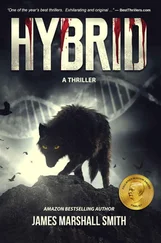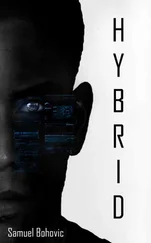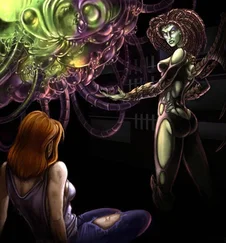Brian O'Grady - Hybrid
Здесь есть возможность читать онлайн «Brian O'Grady - Hybrid» весь текст электронной книги совершенно бесплатно (целиком полную версию без сокращений). В некоторых случаях можно слушать аудио, скачать через торрент в формате fb2 и присутствует краткое содержание. Год выпуска: 2011, ISBN: 2011, Жанр: Триллер, на английском языке. Описание произведения, (предисловие) а так же отзывы посетителей доступны на портале библиотеки ЛибКат.
- Название:Hybrid
- Автор:
- Жанр:
- Год:2011
- ISBN:1936558041
- Рейтинг книги:4 / 5. Голосов: 1
-
Избранное:Добавить в избранное
- Отзывы:
-
Ваша оценка:
- 80
- 1
- 2
- 3
- 4
- 5
Hybrid: краткое содержание, описание и аннотация
Предлагаем к чтению аннотацию, описание, краткое содержание или предисловие (зависит от того, что написал сам автор книги «Hybrid»). Если вы не нашли необходимую информацию о книге — напишите в комментариях, мы постараемся отыскать её.
Hybrid — читать онлайн бесплатно полную книгу (весь текст) целиком
Ниже представлен текст книги, разбитый по страницам. Система сохранения места последней прочитанной страницы, позволяет с удобством читать онлайн бесплатно книгу «Hybrid», без необходимости каждый раз заново искать на чём Вы остановились. Поставьте закладку, и сможете в любой момент перейти на страницу, на которой закончили чтение.
Интервал:
Закладка:
Seven minutes left , he thought. He stared at the dark ceiling, willing his mind to relax. He tried closing his eyes, but all he saw was the dark man kicking a woman’s shoe. He changed his mind’s channel and watched a bead of sweat slowly meander down Dana’s cleavage. He watched for a moment and began to feel an unfamiliar stirring. She stood before him, only now she was naked and beckoning to him; the café had dissolved into a sleazy hotel room. I’m dreaming , he thought, and Dana immediately disappeared. Now all he saw were the blood vessels in his eyelids. I’m awake , he thought, and opened his eyes. He tried relaxing all his muscles, but he still felt the passage of every second.
You’re going to be late , one of his old voices said.
Phil could ignore this one; it dated back to his childhood and instead of growing stronger with time, this one had weakened, making room for the new and more dangerous small voice, the one with the power to destroy his carefully created and insulated world.
As a child Phil and his parents were forced to accept the fact that he would always be different. When he was two his mother noticed that he never cried, and in fact, rarely verbalized at all; when she fed or bathed him he almost never made eye-contact, preferring to stare over her shoulder and track unseen objects. On occasion, however, he would stare at her intensely, following her with his eyes, even crawling and latter walking after her if she left the room, and after finding her he would simply sit down and resume his quiet staring. At first she found it adorable; latter she found it disturbing. When he started stacking his unused toys and the cans in the pantry, his parents sought help. The diagnosis of autism wasn’t much of a surprise, but it was still devastating. Aside from institutional placement, no treatment options were offered. He was still young and required no more care than the average three year old, so the Ruckers made a promise to themselves and to Phil to keep him home for as long as they could safely manage him. Molly Rucker became a full-time stay-at-home mom and slowly coaxed Phil out of his mental prison. Within a year, he had begun to use words, quietly voicing his needs. By age five, his occasional speech was punctuated by verbal outbursts of astonishing clarity and detail. It was clear to the Ruckers and to the pediatricians who examined Phil that while he was emotionally stunted and socially retarded, he was not in the classic sense autistic; whatever was going on was much more complex. By age seven, Phil could pass for a normal child, a strange, intense, and reserved child, but functionally independent. His intellectual development was extraordinary, which only intensified his emotional isolation, both of which intensified the fragmenting of his mind. He explained it to himself in Freudian terms as a lack of self: superego versus id, a constant battle for control. He tried to explain it to his father in terms he would understand; they were at a local swimming pool and the two watched as several boys wrestled over a beach ball in the deep end of the pool. The smallest of the group managed to grab the ball and swim away, but a moment later his bigger and stronger playmates overwhelmed him. They took turns dunking him over and over again; finally, the lifeguard was forced to intervene. Phil took his Father’s hand and pointed at the near-drowned boy, and said simply: “that’s me.”
It doesn’t have to be , the small voice said.
Phil refused to take the bait. This voice was no different from any other; they were all parasites, and if given a chance, they would destroy their host. For thirty years, a pedantic life of discipline and routine had allowed him to live an independent life. He forced himself to remember some of the faces locked behind tall, steel doors. Their screams still echoed in his ears. “That is what happens when control is lost,” Phil said to all of the voices in his head.
The start of a motor made Phil jump, and a moment later his alarm went off. It took him a moment to realize that his neighbor had just started a snowblower. Phil climbed out of bed with unusual agility. His back didn’t seem to bother him. He stood to his full height and waited for the deep, boring pain to settle into its usual place. It had been with him for eighteen years, ever since the car accident that had taken the lives of both his parents and crushed two of his lumbar vertebrae. Except, this morning, it was little more than a muted ache. He slowly arched his back until he felt and heard an audible pop. One of the large bolts that had put his bones back together had broken ten years ago, and his back had popped ever since. It needed to be replaced, but he couldn’t face that ordeal a second time.
He made up his bed exactly as he had for the last thirty years. He didn’t have to be at work for three hours, but two of those would be spent on a treadmill, pushing his body to the limit. Exercise was a constant in his life, serving the dual purpose of minimizing his lower back pain and anesthetizing his Monsters, who had recently developed an unnerving capacity to adapt.
An hour into his run, Phil heard his neighbor’s snowblower abruptly shut down. George and Patsy Van Der had been Phil’s neighbors all his life. He was as fond of them as he was able. George was a retired lawyer, and despite being in his late eighties, was as sharp as he had been half a lifetime ago, and could easily have passed for a man in his early sixties. Patsy, on the other hand, had gone around the bend, as George had said on many occasions. She was moderately senile, but not so far gone that George couldn’t care for her on his own.
Phil listened for George to restart the blower, but it remained quiet. There was no way George could be finished, and no way he would stop before he was finished. Phil ran for another five minutes, and still there was no sound from George. Concern started to grow in Phil’s mind. If George needed help, no one but Phil could deliver it. He still had fifty minutes to run, but it was becoming obvious that it would have to wait. Phil’s mind may have been ruled by The Routine, but his life was ruled by Moral Responsibility.
He climbed off the treadmill and pulled the curtains back. It had snowed more than anyone had expected. George’s driveway was cleared almost all the way to the street, but his snowblower sat idle in the middle of a drift, and George was nowhere to be seen. Phil couldn’t see all the way up the driveway from his windows, so he quickly toweled off, put on warm clothes, boots, and a jacket, and opened his front door. The snow had drifted several inches in front of his door. It always did that when the wind blew in from the west, and some of it spilled into his entranceway. He poked his head out the door and saw George sprawled spread-eagled across his cleared driveway. A tall, dark figure stood over him.
“Hey,” Phil yelled. Not very eloquent, but it managed to redirect the man’s attention away from George. Phil started to run towards them, but immediately tripped and fell face forward into foot-deep snow. He scrambled up, but the tall man was already striding across George’s lawn, leaving a trail of deep footprints. “What did you do?” Phil screamed after him.
“You are too late again, Phillip,” the man called back.
“Come back here,” Phil demanded, but the tall man continued across the yard, seemingly unhindered by the snow. He reached a Ford Taurus parked and idling at the curb just as Phil reached George. Phil bent over his neighbor as the Taurus pulled into the unplowed street. George was dead, his eyes squeezed closed, his face contorted in a mask of pain and horror. Phil reached to check for a pulse, but the blue, livid face told him he wouldn’t find one. He checked anyway. Nothing. He started CPR with no real hope, and after five minutes, gave up. He sat down next to George, breathing hard from the exertion and the pressure of what would have to come next. Patsy was inside, lost in the bliss of a deteriorating brain. Someone would have to explain to her that George, her husband of sixty-four years, would not be coming back inside to make her breakfast ever again. Unfortunately, she had enough of herself remaining to understand what that meant.
Читать дальшеИнтервал:
Закладка:
Похожие книги на «Hybrid»
Представляем Вашему вниманию похожие книги на «Hybrid» списком для выбора. Мы отобрали схожую по названию и смыслу литературу в надежде предоставить читателям больше вариантов отыскать новые, интересные, ещё непрочитанные произведения.
Обсуждение, отзывы о книге «Hybrid» и просто собственные мнения читателей. Оставьте ваши комментарии, напишите, что Вы думаете о произведении, его смысле или главных героях. Укажите что конкретно понравилось, а что нет, и почему Вы так считаете.












